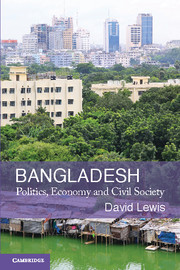Book contents
- Frontmatter
- Contents
- Maps
- Abbreviations
- Acknowledgements
- 1 Introduction
- 2 A State in the Making
- 3 Towards Bangladesh
- 4 State, Politics and Institutions
- 5 Nongovernmental Actors and Civil Society
- 6 Economic Development and Transformation
- 7 Population, Natural Resources and Environment
- 8 Conclusion
- Glossary of Bengali Terms
- Bibliography
- Index
4 - State, Politics and Institutions
Published online by Cambridge University Press: 05 June 2012
- Frontmatter
- Contents
- Maps
- Abbreviations
- Acknowledgements
- 1 Introduction
- 2 A State in the Making
- 3 Towards Bangladesh
- 4 State, Politics and Institutions
- 5 Nongovernmental Actors and Civil Society
- 6 Economic Development and Transformation
- 7 Population, Natural Resources and Environment
- 8 Conclusion
- Glossary of Bengali Terms
- Bibliography
- Index
Summary
This chapter analyses the development of Bangladesh's political institutions and considers the tensions and transformations that have taken place in relation to the main political actors and processes. A period of nation building followed the 1971 Liberation victory under the leadership of Mujib, which was based on the secular nationalist principles that had labelled Islamic political parties as collaborators with the Pakistani army. However, disillusionment ensued as it became clear that Mujib's increasingly rigid and repressive regime had failed to capitalise on the momentum of Liberation. After the 1975 coup, the government of General Ziaur Rahman (Zia) ushered in a new period of military politics. This brought a series of efforts at limited administrative decentralisation, partly as a mechanism designed to build political support and legitimacy for unelected government. After Zia was assassinated in 1981, General H. M. Ershad continued military rule until the restoration of democracy in 1991 after a long mass-opposition movement was eventually translated into a peaceful “people power” removal of Ershad from power.
Four elected governments have now served since that time (two led by the BNP and two by the AL), as well as a two-year period of an ex-tended military-backed caretaker government that took power in 2007–8. The main activities and achievements of these governments are discussed in key areas such as the ongoing government decentralisation, the partial peace settlement achieved in the CHT and the progress with regional negotiations over water sharing with India. The chapter also explores the emergence of the confrontational politics that have characterised government-opposition relationships during this period and considers the main roots of these problems. Understanding the limitations of the political system requires an historical perspective on state formation and recognition of the ways social institutions such as patronage still tend to dominate political institutions. Evidence of a revival of Islamist politics is also considered, notably in the election of the 2001–6 BNP government that, for the first time, included JI coalition members in the cabinet. It concludes by considering the dominant perception among citizens and outside observers of an increasing inability of the state to govern within a political system that has been described as an “illiberal democracy.” A lack of confidence in the capacity of the state to provide basic law and order for citizens or a sound investment climate for national and international capital reached a crisis point at this time when a combination of pressure from the international donor community and a faction within the army led to the imposition of an extended military-backed caretaker government on January 11, 2007. Dr. Fakhruddin Ahmed, a former civil servant, World Bank economist and governor of the Bangladesh Bank, was appointed as the chief adviser. This intervention initially met with considerable public support, and the new government attempted a set of wide-ranging reforms that were aimed at tackling corruption, building political leadership and strengthening the independence of the judiciary. When elections eventually followed, almost two years later in December 2008, the AL achieved a massive majority and formed its second elected government, bringing some new expectations but also continuing many of the old discredited characteristics of dysfunctional politics.
- Type
- Chapter
- Information
- BangladeshPolitics, Economy and Civil Society, pp. 75 - 108Publisher: Cambridge University PressPrint publication year: 2011
- 1
- Cited by



